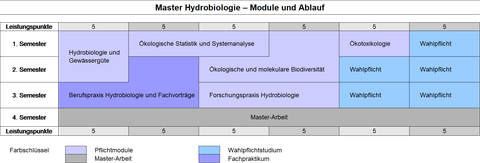Master of Hydrobiology
Table of contents
The master's program in Hydrobiology is accredited.
The Master of Hydrobiology is a german-language study program. More detailed information can therefore be found on the german internet page.
Educational goals and career perspective
Hydrobiology includes the study of aquatic organisms, especially their specific biological adaptations to the aquatic environment. Hydrobiology, in its modern natural scientific form, largely encompasses the field of limnology as a science of inland waterways as an ecosystem. Limnology observes, analyzes and models the relationships in the hydrobiosphere as well as its biological-ecological structure and the material and energy balance.
The aim of the training is the acquisition of qualifications to survey aquatic ecosystems in their unity of structure and function and to use the acquired knowledge independently for the solution of water protection tasks.
Competencies range from molecular to organismic to ecosystem and management levels, including experimental laboratory and field methods, modeling and planning tasks. The training is integrated into the network of water management, forestry, earth sciences and biology and includes working methods of the most important neighboring disciplines such as hydrology / meteorology, environmental chemistry, urban water management and molecular biology.
The graduates are able to meet a variety of complex research and application needs in the field of aquatic ecology through their broad expertise, their mastery of scientific methods, their competence in abstraction and networked thinking.
In the field of hydrobiology, the study comprises fundamental techniques of scientific work, experimental research methods and system-analytical methods for the analysis of observation data as well as for the planning and evaluation of laboratory and field experiments. In addition, the most important techniques for recording water quality are taught. The methodological foundations of ecotoxicology are presented. A broad knowledge of the species and an in-depth understanding of ecological relationships are trained. In all modules of the master's program, the understanding of the system for waters is the focus. Statistical and system analytical procedures are used repeatedly to promote a process-oriented way of thinking. The main focus of the research-oriented modules is on modeling, molecular and ecological techniques. The application-oriented modules focus on techniques of ecotoxicology, waste, urban water management and hydrological analysis.
The graduates find employment in municipalities, water and wastewater associations, the environmental administrations of the federal states and the federal government, state and federal institutions, research institutions as well as engineering and planning companies. Abroad, too, there are many opportunities for cooperation in the planning and implementation of water management measures, especially in connection with sustainable resource use projects.
Study contents and modules
In the master program, the compulsory modules during the first two semesters extend and deepen the basic knowledge of hydrobiology and present environmental factors that affect water bodies. For the total of compulsory modules a total of 65 credit points can be awarded.
The comprehensive elective catalog allows students to deepen their knowledge according to their qualification goals. In compulsory elective courses, at least 25 credits must be earned. The exams take place during the course of studies.
The Master thesis is part of the Master examination that completes the course. It is written in the 4th semester. The processing time is 5 months. The aim of the work is the independent handling of a problem with scientific methods within a given deadline. A total of 30 credit points will be awarded for the master's thesis. The modularized training comprises a total of 120 credit points.

Modulschema Master HYB
The exact module description can be found on the german website.
Study documents, appropriate institutes and contacts
Study documents
The study and examination regulations as well as all other study documents can be found here. Please note that these documents or files are for your information. The study documents published in the official announcements of the TU Dresden are legally binding.
Appropriate institutes
Institute of Hydrobiology
Helmholtz Centre for Environmental Research (UFZ)
Contacts
In case of any questions concerning the study cours please contact the study counselling, the Faculty Students' Council (FSR) or the study course coordinators.
Study requirements
This Master programme is a German-language study programme. More detailed information can therefore be found on the German web page. To start this Master programme, sufficient previous knowledge in the field of Hydrobiology, Hydro Sciences and Engineering are required. The application deadline for EU citizens is 01.04.-30.06. each year and for non-EU citizens 01.04.-31.05. each year. Here you ca find further informations about the study possibilities at the TU Dresden, application, necessary language skills and students' life in Dresden.
